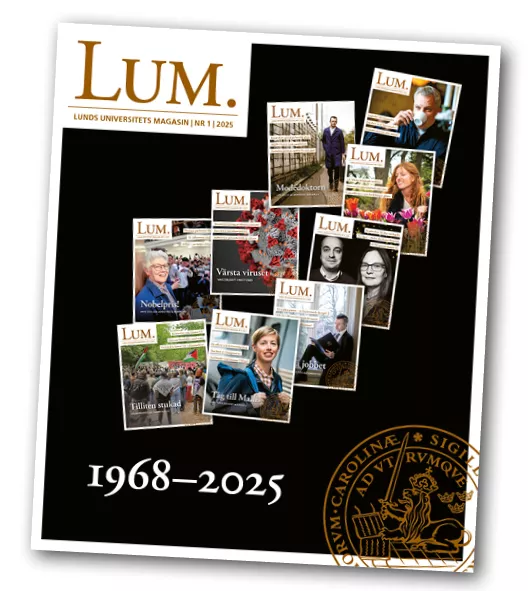What he has missed most during his years as vice-chancellor is proximity to the rest of the organisation.
"I like talking to people", he says.
After forty years in academia with assignments as head of department, dean and deputy vice-chancellor, Torbjörn von Schantz knew what he was getting into when he draped himself in the velvet cloak and put on the vice-chancellor's hat six years ago.
"The previous period prepared me well for the job of vice-chancellor. I knew how hounded you can be, but what I was worried about – that my children would read things about me in the newspaper that weren't true - didn't happen."
However, he found himself far removed from the University's everyday activities. And he didn't get to do much in his own preferred method of leadership, that he describes as "management by walking around”. There was a lot more sitting still in meeting rooms and at corporate lunches and dinners.
Apart from that, leadership itself has been one of the issues he feels most strongly about; primarily collegial leadership, but not without line management.
"As a head of department, I seldom got what I wanted, and I didn't understand why. Uncomfortable management decisions must be taken, and if they are preceded by a discussion in the management group it is easier to go back to your employees and take responsibility, informed by the arguments the others in the group had."
Gender equality an important issue
But one thing he absolutely dislikes is that politicians should wade in and decide, as happened this autumn with the scholastic aptitude test. The Swedish Council for Higher Education, UHR, with 21 vice-chancellors, was in agreement that the test should be cancelled because of the infection risk, but it was overridden by the Minister for Education. Likewise, von Schantz could not silently accept that the Labour Court overturned a dismissal on the grounds of research misconduct, decided by the vice-chancellor after an independent review. "In order not to jeopardise the credibility of research, the government must clarify who is mandated to determine whether research misconduct has occurred in Sweden: academia or the Labour Court?” he wrote both in opinion pieces and his blog.
Gender equality is another issue that Torbjörn von Schantz has championed, and he observes that no one would still say that this was an overworked question. He is proud to have been part of initiating the Tellus project, which mapped out how many employees and students have been subjected to sexual harassment.
"We are not more exposed to harassment here than in the rest of society, but we are doing something about it and creating support functions to address it", he says.
Tellus is also among the common projects that all the faculties have jointly supported, like the Agenda 2030 graduate school and Studiechansen, an initiative to offer study opportunities with new course packages for people impacted by the pandemic in various ways. The RQ20 research evaluation is also enabled by shared funding and in good consultation with all deans.
"You can't change the University culture overnight, but I notice a great difference from my time on the deans' council when we almost exclusively looked out for our own faculties. We have more trust in one another now."
Major challenges need interdisciplinary research
The major challenges facing society have led to much of the research becoming interdisciplinary.
"Wider society has shown that we cannot meet these challenges with technology alone. And as a university, we have never been as important as we are now", says Torbjörn von Schantz.
He reminded himself of that when the job of vice-chancellor sometimes felt overwhelming. He cannot overstate the importance of producing truthful knowledge in times like these. But when it comes to modernising first and second cycle studies, he had hoped to make more progress.
"It is heavy going with a lot of administrative obstacles and views that are bound by tradition."
The students, whose influence in boards and committees he much appreciates, have long demanded ten compulsory weeks of training in teaching and learning in higher education for all teaching staff. Torbjörn von Schantz thinks it is more important primarily to raise the quality of the currently compulsory five weeks.
Looking forward to more time for reflection
Von Schantz would have liked a bit more of the time for reflection and consideration brought on by the pandemic in his earlier years as vice-chancellor, which he felt went by at record speed, and were mostly enjoyable.
"Of course it has been difficult at times, in particular not being able to dispose of your own schedule. But I feel proud and happy. The colleagues I am surrounded by are fantastic. Unfortunately, I have also seen some less pleasant aspects, such as envy and nasty emails to individuals who were only trying to do their best. But we are trained after all to be critical questioners", he muses.
For his own part, he has learnt to be more patient. He doesn't complain about the bureaucracy that surrounds the University, but rather thinks it should be a bit ponderous at times and that important decisions must be allowed to take time. Time is also what he will give himself now.
Now I am just going to enjoy life. Read books, listen to the radio, do carpentry, fishing and gardening. I appreciate time for reflection and I am a homebody!”




